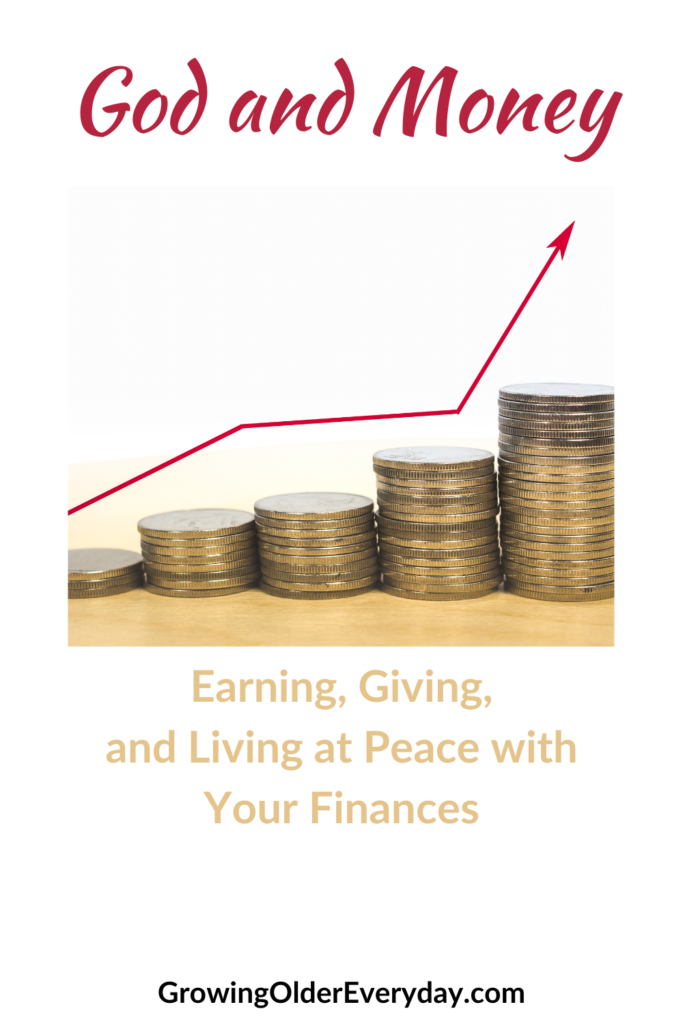Earning, Giving, and Living at Peace with Your Finances

Becky was a stay-at-home mom with three little boys. She loved her sons and considered them her biggest blessing. She enjoyed being home with them, but in the area where she and her husband lived, getting by on a single income was difficult.
So, Becky looked for ways to make more money while continuing to raise her children. When she mentioned to some of her Christian friends, she was searching for these opportunities, they shamed her for wanting more money. One even accused her of not trusting God, while another questioned the sincerity of her faith.
Is It Un-Christian to Want to Make More Money?
When it comes to money, many Christians have a lot of hang-ups. Those who don’t understand God’s Word have distorted the concept of money.
The first and most important thing to understand about money is that it’s not evil. Some Christians have been taught that “money is the root of all evil”. This stems from an incorrect understanding of 1 Timothy 6:10. Here’s the actual text of the verse from the New Living Translation (NLT) “For the love of money is the root of all kinds of evil. And some people, craving money, have wandered from the true faith and pierced themselves with many sorrows.”
From the text, it’s clear that the love of money risks leading us astray in our faith. It’s when we love money more than we love people and more than we love God that we step into spiritual quicksand.
What Does Money Really Mean?
Money is much like time. It has no real value, except what we assign to it. For example, let’s say you have an extra hour of time today. You might choose to spend that hour with your grandchild at the park and consider it time well-spent. Or you could spend that hour waiting in line at the DMV only to get to the counter and realize you’ll have to come back another day. You’ll probably consider that hour of time wasted. Either way, it was an hour of time. But how you valued that hour depended entirely upon your circumstances and the result it brought about.
It’s a similar concept with money. Your friend may place a very low value on money, preferring to work a job where he’s happy (even if he’s not paid very well). He might choose to stay in a small house and drive an older car, perfectly content to live this way for the rest of his life. But you may place a much higher value on money. You might choose a job based on how much you’ll earn or how much you’ll be able to earn in the coming years. You might choose to live in a larger house or own two cars instead of one.
None of these decisions makes you better or worse than your friend. It’s simply a matter of value. If you and your friend value serving God and loving others more than how much you make (or don’t make), you’re both on the right track.
What About Tithing?
It’s hard to have a conversation about money and Christianity without tithing coming up. Some Christians cheerfully give a portion of their income to the church each week and don’t think twice about it. Others struggle with the idea and wonder if it truly matters to God whether they give.
To dig deeper into the idea, it’s helpful to understand why tithing was first commanded in the Bible. God wanted His people to take a portion of their crops and give it back to Him. Here’s more insight in Deuteronomy 14:28-29 (NLT): “At the end of every third year, bring the entire tithe of that year’s harvest and store it in the nearest town. Give it to the Levites, who will receive no allotment of land among you, as well as to the foreigners living among, the orphans, and the widows in your towns, so they can eat and be satisfied. Then the Lord your God will bless you in all your work.”
The purpose of the tithe was to provide for those who worked in the church (the Levites) as well as those who were financially destitute, like foreigners, orphans, and widows.
Nowadays, most Christians aren’t farming the land. Instead, you probably work a job and earn a paycheck each week. Setting aside a small portion to give back to the church or those in need can be a wonderful way of honoring God.
But it’s not really about the amount you give to God. It’s about the heart or spirit behind your giving. So Paul urged the Corinthians in II Corinthians 9:6-7 (NLT) to prepare their generous gifts with the right attitude. He said: “Remember this — a farmer who plants only a few seeds will get a small crop. But the one who plants generously will get a generous crop. You must each decide in your heart how much to give. And don’t give reluctantly or in response to pressure. ‘For God loves a person who gives cheerfully.'”
Should You Give It All Away?
Nancy started an online business a few years ago. Her mission was to provide eyeglasses for kids in need. Because she’s so passionate about her goal, Nancy only takes ten percent of her profits and invests them back into her business. The remaining ninety percent goes directly to the families she helps.
Some Christians feel led to start a ministry or a business and they never actually get a paycheck from it. This can be rewarding and enjoyable…if you’re truly called to it. Indeed, if you are, then God can certainly sustain and strengthen you. But if you’re doing it out of misplaced guilt or a desire to be seen in a certain way, then you’ll likely grow to resent this new venture. You may wonder why things are so difficult and struggle to get your new attempt going.
There’s nothing wrong with starting a business or company, just like there’s nothing wrong with purchasing a home. The important thing is simply that you view all your resources as gifts from God that you’re willing to use to serve Him.
Are You Judging Others for Their Wealth?
After an encounter with a rich young ruler, Jesus had strong words to say about those with considerable wealth. “But Jesus said again, “Children, how hard it is to enter the kingdom of God! It is easier for a camel to go through the eye of a needle than for someone who is rich to enter the kingdom of God.” – Matthew 10:24-25 (King James Version)
At first glance, it sounds like Jesus is condemning wealth. But it’s clear from the passage surrounding this verse, that’s not the point at all. Jesus is once again denouncing the love of money. You see, the rich young ruler wanted to serve God. But when Jesus challenged him to give up everything and become his follower, the man walked away. He chose the love of money over the steadfast love of Christ.
While it’s tempting to shake our heads and say we wouldn’t make the same decision, the truth is it’s easy to. In fact, we can do it daily—by focusing on work and money to the exclusion of spending time with God, loving our families, and joyfully taking part in our communities.
What Is Stewardship?
That’s why it’s important that Christians focus on stewardship. The idea behind this is that you don’t truly “own” anything you have – not your house, your car, your time, your money, or your talents. Instead, stewardship is about viewing these items as generous gifts from God. In Acts 17:24-25 (NLT) Luke wrote: “He is the God who made the world and everything in it. Since He is Lord of heaven and earth, He doesn’t live in man-made temples, and human hands can’t serve His needs — for He had no needs. He Himself gives life and breath to everything, and He satisfies every need.”
Everything in your life is a gift from God, and it’s on loan to you. As His beloved child, God wants you to use every resource He’s given you. He wants you to honor Him with every part of your life and that includes your house, car, time, money, and talents.
Stewardship isn’t just about money. It’s not how much you put into the offering plate on Sunday mornings. Nor is it whether you donate to a charitable organization that feeds the hungry or cares for the homeless. It’s about being more open with your hands. If you are living with your hands open, you get to bless others and you will also receive blessings you would have otherwise missed.
That’s what happened to Ava. When she shared a few extra slices of pizza with a homeless vet on the street, she watched in awe as he blessed someone else with extra food as well. Seeing the homeless man give away what little he had humbled Ava and made her determined to become more generous in her own life. Where she’d previously found it difficult to give, she now found it easy.
“I realized that by providing for others, God would always provide for me. There’s a verse that I never understood until that day—I was young and now I am old, yet I have never seen the righteous forsaken or their children begging bread.” She said, referencing Psalm 37:25.
What Does Stewardship Look Like?
It’s great to talk about stewardship and it’s exciting to think of all you have as a gift from God. But sometimes, it’s hard to move from a warm fuzzy feeling to taking actual action. After all, stewardship is a broad concept and you might wonder what it looks like in day-to-day life.
Stewardship is an attitude. It’s one of submission to the Holy Spirit. Try this the next time you’re praying. Say, “God, You’ve given me so much and I’d like to be a blessing to someone else. I am Your steward and everything I have is Yours. Please show me who I can bless this week and how I can give to them.” These are the kinds of prayers that God delights to answer! He loves sending someone in need to a willing heart.
Sometimes, God will put someone on your mind right away. He could remind you to help the disabled man down the street with his rain gutters. Or may the widow at your church who is low on funds for food, between social security checks.
God may also stretch you in a new way by using a resource you normally hold close. For example, you might be an introvert who prefers spending your nights at home with your family. God might prompt you to open up your home one night a week for a Bible study for teenagers in your church. He could ask you to take in a stranger for the night.
What If I’m Nervous?
It’s normal to be nervous when you think about following God’s leading with the resources He’s entrusted to you. Perhaps you fear if you help out a neighbor one time, you’ll be the person who’s called on to do it all the time. Maybe you fret that if you buy groceries for a family in your neighborhood, there won’t be enough left over for yours.
But understand that God can sustain you in unknown places. Just as God’s grace is limitless, so is His provision. There’s a fascinating verse tucked away in Psalm 50:10 (NLT) about God’s amazing resources. “For all the animals of the forest are mine, and I own the cattle on a thousand hills.”
Pause and meditate on that truth for a moment—God owns everything already! He doesn’t need your resources. Rather, He’s inviting you to partner with Him in the work He’s already doing.
What If It’s an Adventure?
Just like a mother welcomes her toddler into the kitchen when she’s baking and patiently lets him “help” her, God is the same way. He beckons you close, inviting you to share in the experience with Him.
Yes, you might make a mess sometimes. Maybe you’ll assist somebody, and you won’t do it quite right. Or you’ll feel awkward while you’re cleaning out those rain gutters for the disabled neighbor or showing up with food at the widow’s home. But the point isn’t how you feel or don’t feel. It’s about showing up with open hands and telling God, “Here I am—send me!”
Has God called you to help others? What is your favorite charity? Please answer below. Mine is New Day for Children, an organization that helps rescued children gain back their lives, after being sexually trafficked.

